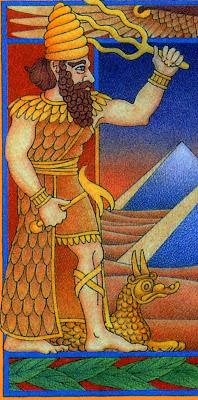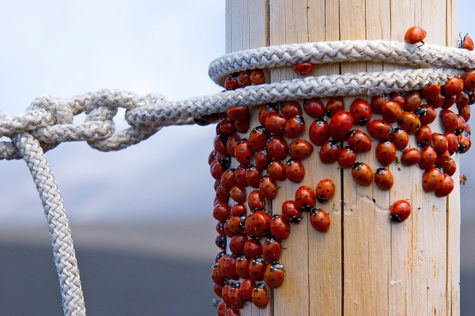Fire
Ladybird Ladybird Fly Away Home
This traditional verse relates to ladybirds, brightly colored insects commonly viewed as lucky. We’ve all heard this rhyme. There are dozens of different variations. But what does it mean?
The name ladybird contains a reference to Mary, mother of Jesus, often referred to as Our Lady. It is possibly connected with a story that after prayers for help Our Lady brought Ladybird beetle to destroy a plague of plant-destroying pests. According to other lore, farmers recite the rhyme to save the insects who do them this service before setting fire to stubble fields.
The English version has been dated to at least 1744. The verse has several popular forms, including:
Ladybird, ladybird fly away home,
Your house is on fire and your children are gone,
All except one, and her name is Ann,
And she hid under the baking pan.
A shorter, grimmer version concludes:
Your house is on fire,
Your children shall burn!
Among children, it is common to place the ladybird on their hand or blow it from their clothing and make a wish while reciting the rhyme. My favorite variation is this one, written early in the 19th century:
Lady-bird, Lady-bird, fly away home,
The field mouse is gone to her nest,
The daisies have shut up their sleepy red eyes
And the birds and the bees are at rest
Because of the religious connotation, one speculation would date the rhyme back to the 16th century and have it sung as a warning at a time when there was legislation against Catholics.
More variations include the following:
Ladybird, ladybird, fly away home,
Your horse is on foot, your children are gone;
All but one, and that’s little John,
And he lies under the grindle stone.
Dowdy-cow, dowdy-cow, ride away heame,
Thy house is burnt, and thy bairns are tean.
Marybug, fly away,
your house is on fire,
your wee mother weeps
Sky-winger, fly away,
your house is in flames,
your children together in tears
This info came from wikipedia. You can find an infographic with the different varieties of ladybird insects at Totally Random, and some nice ladybug pictures at Way Cool Pictures.
If you are interested in Ladybugs, you can check out this detailed post about Ladybug Totems and Guides, and a crazy Ladybug Toothache Cure.
Gibil
From the Fifty Names of Marduk in the Necronomicon Spellbook.
The Forty-Sixth Name is GIBIL.
This Power has been given the Realm of the Fire and the Forge. He keepeth the sharp point of the Sword and the Lance, and giveth understanding in the working of metals. He also raises the Lightning that comes from the Earth, and maketh Swords to appear in the Sky. His Word is BAALAGNITARRA.
According to the esoteric teaching, this Spirit initiates the magician into the processes of self-knowledge, refining those base components of ourselves that remain secret even to us, or are revealed through the costly process of psychotherapy and analysis. Helps you to understand why you are the victim of passions and urges you cannot control, and how to eventually control them. Worth the trouble involved to invoke for the serious student.
Important note:
“The Signs and Powers may be summoned after the Priest has ascended to that step on the Ladder of Lights and gained entrance to that Sacred City. The Signs should be engraved on parchment or sealed in clay and placed upon the altar at the Calling. And in the perfumes should be of cedar, and strong, sweet-smelling resins. And the Calling be to the North.”
More information:
According to Sumerian mythology, Marduk was the God who defeated the Ancient Ones long before the creation of matter as we know it.
 Against him in battle were the fierce TIAMAT, KINGU, and AZAG-THOTH. Once he had destroyed these demons, he created the universe from the flesh of TIAMAT, and humanity from the blood of KINGU mixed with his own breath.
Against him in battle were the fierce TIAMAT, KINGU, and AZAG-THOTH. Once he had destroyed these demons, he created the universe from the flesh of TIAMAT, and humanity from the blood of KINGU mixed with his own breath.
You will come across these names in the description of the Fifty Names, which were titles given to Marduk by the Elder Gods after he had helped them to defeat the Ancient Ones.
Related links:
- Pagan Calendar – Marduk’s Feast Day
- The Powers That Be – Marduk The God
- Widdershins – Marduk Legends and Stories, the original translation of the Enûma Eliš, and the Fifty Names of Marduk as originally given in the ancient tablets.
Asaruludu
From the Fifty Names of Marduk in the Necronomicon Spellbook.
The Seventh Name is ASARULUDU.
Wielder of the Flaming Sword, oversees the Race of Watchers at the bidding of the Elder Gods. He ensures the most perfect safety, especially in dangerous tasks undertaken at the behest of the Astral Gods, his Word is BANMASKIM.
Like the Angel in Genesis, this Spirit protects a place, a home or temple, from negative psychic and magickal attacks. Like the Sixth Spirit, merely the pronunciation of his Word BANMASKIM is sufficient to dispel hostile influences when shouted to the four quarters. Maskim and Rabisu are the names of ancient Sumerian demons.
Important note:
“The Signs and Powers may be summoned after the Priest has ascended to that step on the Ladder of Lights and gained entrance to that Sacred City. The Signs should be engraved on parchment or sealed in clay and placed upon the altar at the Calling. And in the perfumes should be of cedar, and strong, sweet-smelling resins. And the Calling be to the North.”
More information:
According to Sumerian mythology, Marduk was the God who defeated the Ancient Ones long before the creation of matter as we know it.
 Against him in battle were the fierce TIAMAT, KINGU, and AZAG-THOTH. Once he had destroyed these demons, he created the universe from the flesh of TIAMAT, and humanity from the blood of KINGU mixed with his own breath.
Against him in battle were the fierce TIAMAT, KINGU, and AZAG-THOTH. Once he had destroyed these demons, he created the universe from the flesh of TIAMAT, and humanity from the blood of KINGU mixed with his own breath.
You will come across these names in the description of the Fifty Names, which were titles given to Marduk by the Elder Gods after he had helped them to defeat the Ancient Ones.
Related links:
- Pagan Calendar – Marduk’s Feast Day
- The Powers That Be – Marduk The God
- Widdershins – Marduk Legends and Stories, the original translation of the Enûma Eliš, and the Fifty Names of Marduk as originally given in the ancient tablets.






